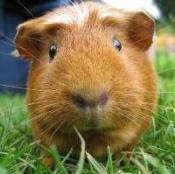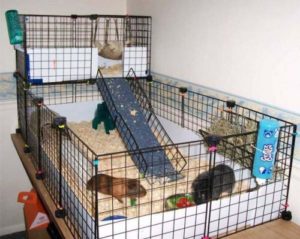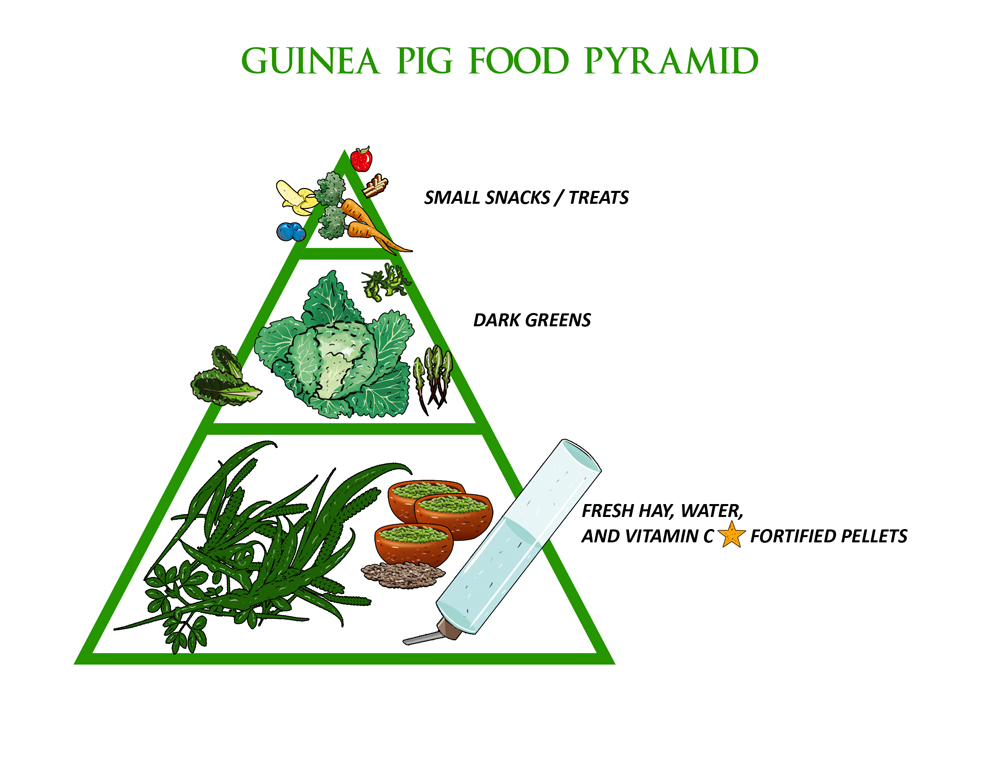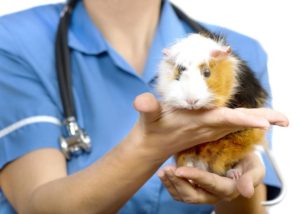 Guinea pigs are members of the rodent family and originate in South America. They are born fully haired, eyes open and ready to run. Guinea pigs can live alone or in small groups of just females or just males. Two females will do well together, two males from the same litter as babies may do well together, but two males from different litters will fight. If you put a male with two females, they are going to breed. They make great pets for adults and children alike and enjoy the human-animal bond that develops between owners and their pets.
Guinea pigs are members of the rodent family and originate in South America. They are born fully haired, eyes open and ready to run. Guinea pigs can live alone or in small groups of just females or just males. Two females will do well together, two males from the same litter as babies may do well together, but two males from different litters will fight. If you put a male with two females, they are going to breed. They make great pets for adults and children alike and enjoy the human-animal bond that develops between owners and their pets.
Housing
 Guinea pigs are very active pets so buy the largest cage possible, each guinea pig should have a minimum of 2 square feet of cage. There are cages that are specifically made for guinea pigs that do not have wire on the cage bottom. This is an important feature as guinea pigs can get their feet caught in the wire and break a leg very easily. Fresh bedding should be used and changed 1-2 times weekly, depending on the number of pets you keep. Carefresh is an excellent product for this purpose. It is a newspaper-based bedding that is very soft and absorbent. Cedar and pine shaving should be avoided because the wood products can cause eye and feet irritations, as well as upper respiratory problems. They have continuously growing teeth so you will need to provide plenty of stuff for them to chew on. Guinea pigs enjoy playtime and run and jump with obvious joy. They like tossing toilet paper rolls and even some small dog toys around. Providing tubes to run through and little houses to hide in help keep your pet content
Guinea pigs are very active pets so buy the largest cage possible, each guinea pig should have a minimum of 2 square feet of cage. There are cages that are specifically made for guinea pigs that do not have wire on the cage bottom. This is an important feature as guinea pigs can get their feet caught in the wire and break a leg very easily. Fresh bedding should be used and changed 1-2 times weekly, depending on the number of pets you keep. Carefresh is an excellent product for this purpose. It is a newspaper-based bedding that is very soft and absorbent. Cedar and pine shaving should be avoided because the wood products can cause eye and feet irritations, as well as upper respiratory problems. They have continuously growing teeth so you will need to provide plenty of stuff for them to chew on. Guinea pigs enjoy playtime and run and jump with obvious joy. They like tossing toilet paper rolls and even some small dog toys around. Providing tubes to run through and little houses to hide in help keep your pet content
Feeding

Guinea pigs prefer using a water bottle rather than a bowl if given the choice. Water bowls also tend to get full of litter and debris quickly so keep this in mind when purchasing your equipment. Hay should be fed in abundance each day and should always be available. Timothy, alfalfa, oat, sweet grass, and meadow grass are all great options. An important side note to remember; too much alfalfa can cause urinary tract problems because of high calcium, so feed this type of hay sparingly. Guinea pigs can’t synthesize vitamin C, their diet must be supplemented with this vitamin. If they do not get enough vitamin C, they can develop scurvy. By feeding small amounts of fresh dark greens and fruits, your pet will have a well balanced diet. The darker the green vegetable, the higher the vitamin C content. Food pellets can also be offered as a treat. ½ cup given daily should be adequate.
Veterinary Care
We recommend spaying and neutering your guinea pigs, not only for the sake of population control but also to  prevent reproductive cancers and tumors. Your guinea pig should get an annual veterinary visit, just like other animals. At this visit we have a chance to assess your guinea pig’s weight (as obesity is a common issue) we can also trim his or her nails and teeth if needed. If your guinea pig is displaying a hunched or huddled posture this could be the first sign he or she may be getting sick. Bring your Guinea pig into us if you observe; balancing problems, protrusion of the lower belly, salivation, grooming neglect, reduced appetite, weight loss, difficulty breathing, constipation or runny stools.
prevent reproductive cancers and tumors. Your guinea pig should get an annual veterinary visit, just like other animals. At this visit we have a chance to assess your guinea pig’s weight (as obesity is a common issue) we can also trim his or her nails and teeth if needed. If your guinea pig is displaying a hunched or huddled posture this could be the first sign he or she may be getting sick. Bring your Guinea pig into us if you observe; balancing problems, protrusion of the lower belly, salivation, grooming neglect, reduced appetite, weight loss, difficulty breathing, constipation or runny stools.



Comments are closed.